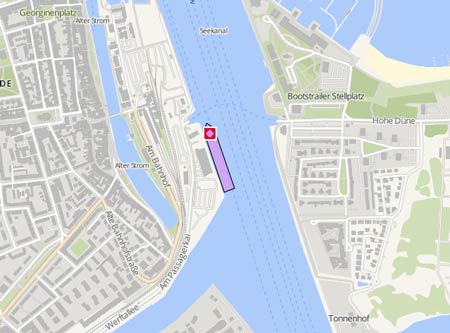AUTO ECO
Course/Position
Latest ports
Latest Waypoints
Latest news
Towline snapped and damaged assistance tug
On Feb 23, 2025, the Marine Accident Investigation Branch (MAIB) started investigating the failure of a towline on board the tug 'Svitzer Avon' (IMO: 9788162) on Feb 4, while the vessel was assisting the 'Auto Eco' to Bristol in the approach to Royal Portbury dock, Avonmouth, The failure and the resulting lashing back of the line damaged the wheelhouse on the' Svitzer Avon' and injured two tug crew members. The 'Auto Eco' left Bristol again on Feb 5 en route to Zeebrugge.
UECC’s New ECO Class Vessels to Operate a Regular Service to PLP
Petrolesport ro-ro terminal (a Global Ports facility) has finished unloading the first vessel of a new ecological class series owned by United European Car Carriers (UECC), a leading ro-ro line operator. The terminal successfully handled three vessels carrying 1,840 cars and 370 heavy ro-ro vehicles. The cars arrived to PLP on a regular service Saint Petersburg – Uusikaupunki – Bremerhafen – Southampton – Zeebrugge – Malmoe – Hanko – Saint Petersburg. After a successful completion of a trial unloading, the service operates two vessels of the same serries – M/V Auto Eco and M/V Auto Energy. The vessels call at Petrolesport weekly on Saturdays. M/V Auto Eco and M/V Auto Energy are the biggest dual fuel car and truck carriers in the world. They can operate on both fuel oil and liquefied natural gas (LNG). LNG technology substantially reduces fuel consumption and decreases CO2 and NOx emissions, as well as almost eliminating Sulphur Oxide and particulate matter emissions. The new technology is fully compliant with strict environmental requirements applied in the Baltic Sea region. http://www.hellenicshippingnews.com/ueccs-new-eco-class-vessels-to-operate-a-regular-service-to-plp/
World's first dual-fuel LNG pure car truck carrier (PCTC) named in Zeebrügge
November 24 - United European Car Carriers (UECC) named the world's first dual-fuel LNG pure car truck carrier (PCTC), Auto Eco, at a ceremony at the Port of Zeebrugge earlier this week. Representatives of UECC's owners - Nippon Yusen Kabushiki Kaisha (NYK) and Wallenius Lines - were present at the event. Claire Tillekaerts, ceo of Flanders Investment & Trade, was named as the ship's godmother. The first in a two sistership order, Auto Eco was built in conjunction with Kawasaki Heavy Industries at the NACKS shipyard in China. Speaking at the event Glenn Edvardsen, ceo of UECC, said: "It is the first PCTC of its kind in the world to be fitted with a dual-fuel LNG propulsion system, allowing it to complete a fourteen-day round -trip voyage solely on LNG without refueling. Auto Eco not only meets existing emissions regulations but also exceeds them, allowing her to trade in any environment control area, worldwide." Auto Eco is built to meet the Super 1A Finnish/Swedish ice class standard, Edvardsen stated: "To make sure the vessel can trade safely in icy waters, Auto Eco has been constructed to meet the highest ice class standard: Super 1A Finish /Swedish ice class. She may be scheduled to trade in the Baltic Sea, but Auto Eco is capable of sailing just about anywhere - including the Northeast or Northwest Passage if ever called upon." http://www.heavyliftpfi.com/news/uecc-s-dual-fuel-lng-ship-named.html
Upload News

